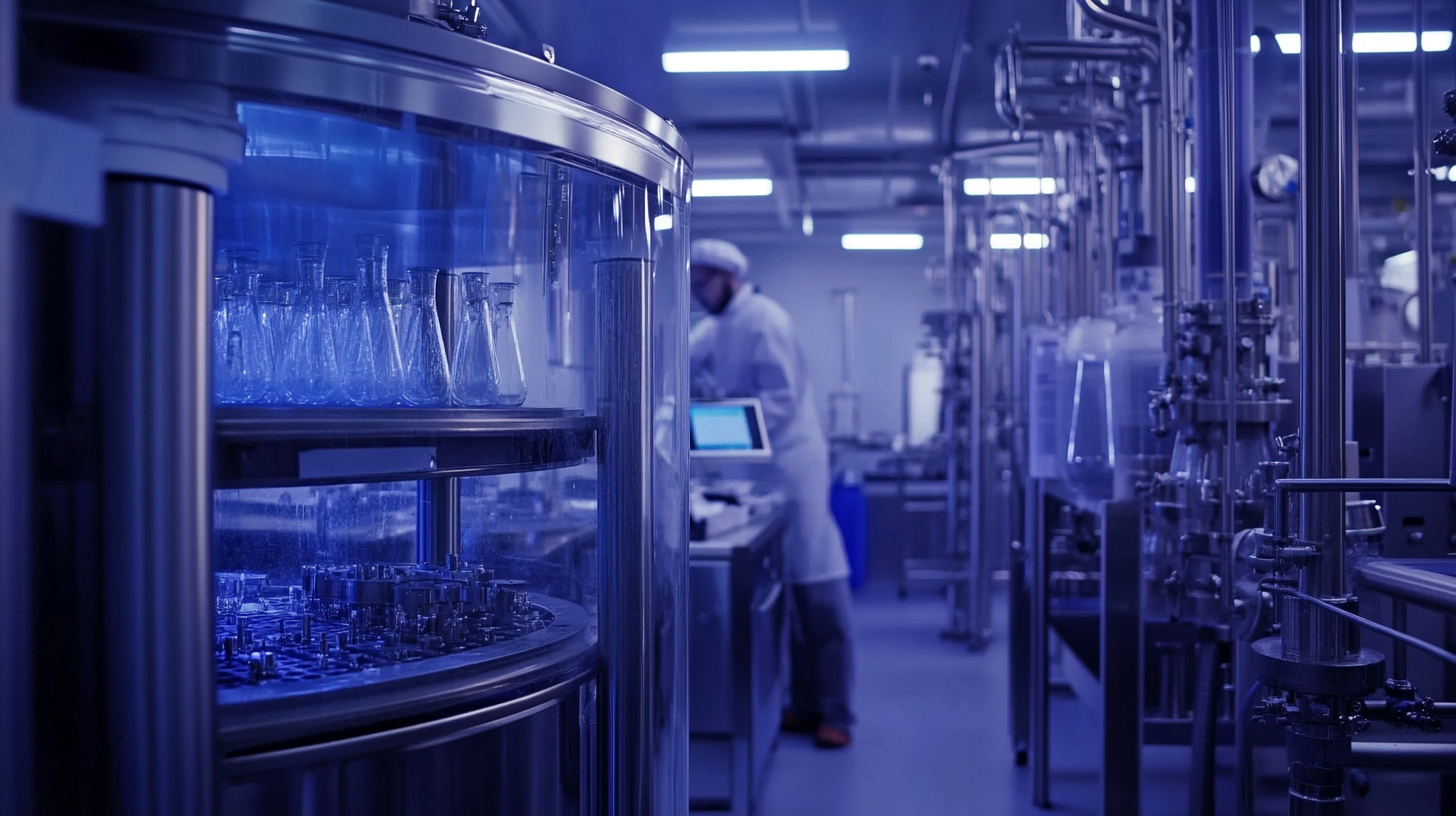The food and beverage industry is continuously evolving, driven by changing consumer preferences and the demand for innovative products. At the heart of this transformation is "Formulation Manufacturing," a critical process that enables manufacturers to create unique formulations that cater to diverse taste profiles, dietary needs, and health-conscious trends. This specialized manufacturing approach not only enhances product quality but also accelerates the development of groundbreaking offerings that can capture market attention and consumer interest.
In an increasingly competitive landscape, the ability to innovate through formulation manufacturing is vital for brands looking to stand out. This process encompasses a range of techniques and technologies that allow for the customization of flavors, textures, and nutritional content, ensuring that products meet the specific demands of modern consumers. As we delve deeper into the impact of formulation manufacturing, we’ll explore how it serves as a catalyst for innovation, helping companies not only to meet existing market demands but also to anticipate future trends in the dynamic world of food and beverages.

In the competitive landscape of the food and beverage industry, formulation manufacturing plays a pivotal role in creating unique food products that cater to evolving consumer preferences. By applying advanced scientific principles and techniques, manufacturers can develop innovative formulations that enhance flavor profiles, improve nutritional value, and address dietary restrictions. This flexibility allows brands to differentiate themselves in a crowded marketplace, offering products that not only taste great but also meet specific health and wellness needs. Formulation manufacturing is crucial for exploring new ingredient combinations and processing methods. Through rigorous experimentation and research, food scientists and product developers can identify the perfect balance of textures, tastes, and aromas that appeal to diverse consumer segments. This creative process is essential for launching novel items, such as plant-based alternatives or functional foods enriched with probiotics, which have gained substantial traction in recent years. Moreover, collaboration between formulation manufacturers and food brands fosters a culture of innovation. By leveraging shared expertise and technology, companies can respond quickly to market trends, creating products that resonate with consumers. As sustainability becomes increasingly important, formulation manufacturers are also exploring eco-friendly ingredients and packaging solutions, further driving product uniqueness while appealing to environmentally conscious shoppers. Through these efforts, formulation manufacturing becomes a cornerstone of the food and beverage industry's evolution, enabling the development of groundbreaking food products that shape the future of how we eat and drink.

In the rapidly evolving food and beverage industry, innovative techniques in formulation play a crucial role in enhancing flavor profiles that captivate consumers. According to a report by Mordor Intelligence, the global flavor market is projected to reach USD 19.4 billion by 2025, illustrating the increasing consumer demand for novel and unique taste experiences. Formulation manufacturing is at the forefront of meeting this demand, employing advanced technologies such as encapsulation, microencapsulation, and flavor modulation to deliver complex flavors that are not only appealing but also sustainable.
One particularly exciting trend is the use of plant-based ingredients to create innovative flavor profiles. The rise in health-conscious consumers has driven companies to explore natural flavor enhancers and clean label formulations. According to a survey by the International Food Information Council, 77% of consumers are more likely to purchase food products with all-natural ingredients. This shift has encouraged manufacturers to invest in research and development to combine flavors that align with the health and wellness movement while still providing satisfying taste experiences.
Furthermore, sensory science has emerged as a pivotal factor in formulation innovation. Companies now leverage consumer insights and sensory analysis to tailor products that cater to specific preferences and market trends. Research from the Sensory Analysis Society indicates that products optimized for sensory appeal can increase consumer purchase intentions by 35%. By focusing on the intricate balance of flavors and utilizing cutting-edge formulation techniques, the food and beverage industry is poised to continuously surprise and delight consumers with products that reflect their evolving tastes and expectations.

Sustainability has become a pivotal focus in the food and beverage industry, driving companies to innovate in their formulation processes. According to a 2022 report by the Hartman Group, 75% of consumers actively seek sustainable food products, indicating a clear preference for brands that prioritize environmental responsibility. This shift is not just a trend; it’s an essential pivot in addressing consumer demand for transparency and eco-friendliness in product formulations.
As food manufacturers adopt sustainable practices, they are re-evaluating their ingredient sourcing, production methods, and packaging solutions. Recent findings from a Nielsen report highlight that products marked as “sustainable” can see sales increases of up to 20%. This underscores not only the financial incentives for companies that embrace sustainability but also the competitive advantage they gain in an increasingly eco-conscious market. Using plant-based ingredients, reducing carbon footprints, and minimizing waste are some of the innovative approaches being integrated into formulation manufacturing.
Moreover, companies are investing in technologies that facilitate sustainable practices, such as alternative protein sources and environmentally friendly preservatives. A study by MarketsandMarkets projected that the sustainable food and beverage market would reach $1 trillion by 2026, illustrating the profitability of investing in formulation innovation that aligns with sustainability. As consumer expectations evolve, the food and beverage industry must continue to adapt, ensuring that they deliver not only quality products but also those that resonate with a sustainable ethos.

The rapid advancement of technology has transformed various industries, and the food and beverage sector is no exception. Automation is revolutionizing formulation processes, enabling manufacturers to streamline production, reduce costs, and enhance product quality. According to a recent report by ResearchAndMarkets, the global food automation market is projected to reach $15.3 billion by 2024, growing at a CAGR of 6.6%. This shift towards automation is not merely a trend but a necessary evolution to meet the rising consumer demand for innovative and diverse food products.
Automated systems in formulation manufacturing allow for precise ingredient measurements and consistency in product quality, two critical factors in the highly competitive food and beverage industry. With the integration of smart sensors and IoT technologies, companies can monitor real-time data and make adjustments on-the-fly, significantly reducing the time from concept to market. A survey conducted by Deloitte indicated that 88% of food manufacturers are investing in process automation, signaling a clear trend towards embracing technology to enhance operational efficiency.
Moreover, automation is also leading to increased compliance with regulatory standards, which is essential in an industry where safety and quality are paramount. According to a report by the Food Processing Suppliers Association, 75% of food manufacturers believe that automation helps them to maintain these standards more effectively. As businesses leverage automated solutions, they are expected to drive innovation in flavor profiles, textures, and nutritional content, ultimately leading to a richer assortment of products available to consumers.
In the dynamic sphere of food innovation, the collaboration between chefs and scientists plays a pivotal role in shaping the future of the culinary arts. As demonstrated by recent groundbreaking projects, such as the development of a fully edible robotic wedding cake, this intertwined relationship is redefining not only what we eat but also how we think about food. Chefs, equipped with their culinary intuition, and scientists, armed with research and technology, are merging their expertise to create unique gastronomic experiences that push the boundaries of traditional cooking.
A compelling instance of this collaboration is CreAsia Studio's initiative, which emphasizes the use of innovative ingredients like fungi to transform food waste into gourmet delights. This approach is emblematic of a broader trend within the industry, where sustainability meets creativity. Driven by the need for responsible consumption, culinary innovators are continuously exploring ways to reduce waste while enhancing the flavor and nutritional value of their offerings. Events like the Research Chefs Association Conference further illustrate this synergy, gathering industry experts to exchange the latest advancements in food product development and foster further innovation.
Furthermore, academic institutions are joining forces with culinary professionals, as seen in King's College London's participation in the Menus of Change University Research Collaborative. Such partnerships not only bolster research efforts but also ensure that the culinary world remains at the forefront of addressing contemporary challenges, such as sustainability in food sourcing and production. As the food and beverage industry continues to evolve, the collaboration between chefs and scientists will undoubtedly remain a cornerstone of innovation, paving the way for a more sustainable and exciting future in gastronomy.
